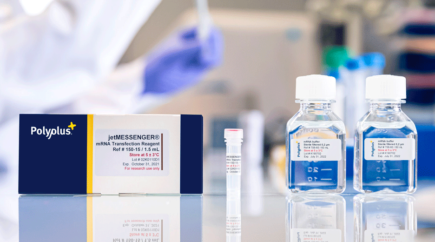jetMESSENGER® is a designed for high mRNA transfection efficiency in primary cells, cancer cell lines, neurons, and stem cells.

In recent years, use of messenger RNA (mRNA) has grown considerably in the development of strategies for vaccination, induced Pluripotent Stem (iPS) cell-derived and genome editing therapies. Optimal mRNA delivery within cells is technologically challenging.
To overcome this hurdle, Polyplus-transfection® has developed jetMESSENGER®: a non-viral mRNA delivery system that ensures maximal transfection efficiencies in both routine cell lines and most of the difficult to transfect cell types. To make sure that the efficiency of mRNA delivery results in gene expression, the quality of the mRNA used is primordial and relies on the mRNA synthesis method.
Quality of mRNA molecules is crucial to ensure efficient delivery using jetMESSENGER® and subsequent translation to achieve transient protein expression. mRNA synthesis, and more generally of large RNA molecules for transfection applications, has become an effortless and straightforward method due to the rise of robust and reliable in vitro transcription systems.
Quick RNA synthesis is achieved by simply mixing the four ribonucleotides, cap analog, RNA polymerase and an appropriate double-stranded DNA template (e.g. linearized plasmid, PCR product…). Chemically modified nucleotides such as 5-methylcytosine and pseudouridine are often used to generate in vitro transcripts; their incorporation has been shown to improve stability of synthesized RNA and reduce immunogenicity upon transfection. Furthermore, both 5’ capping and 3’ polyadenylation of in vitro transcripts are mandatory to ensure translation of mRNA into a protein: the 5’ capping plays a role in ribosomal recognition at the start of translation, and the 3’ polyadenylation in protecting the transcript from degradation.
For more information on in vitro transcription systems and mRNA synthesis for transfection using jetMESSENGER®, please feel free to contact our Scientific Support.